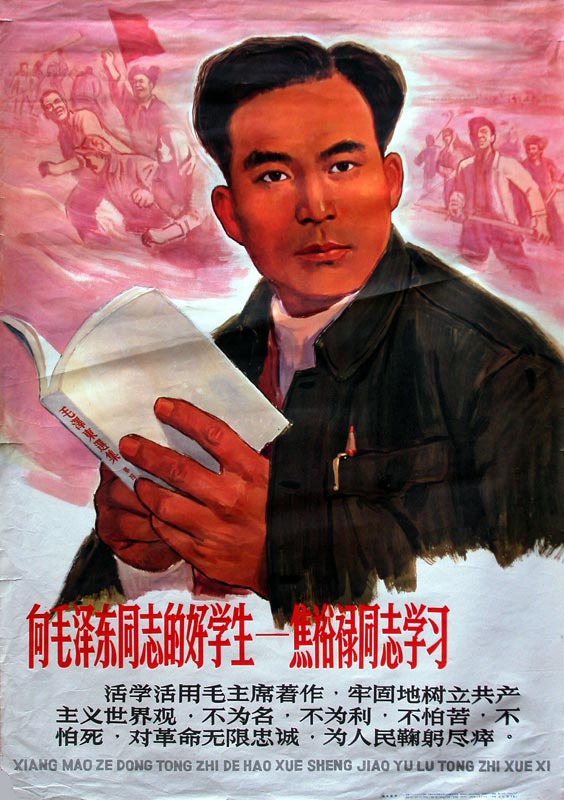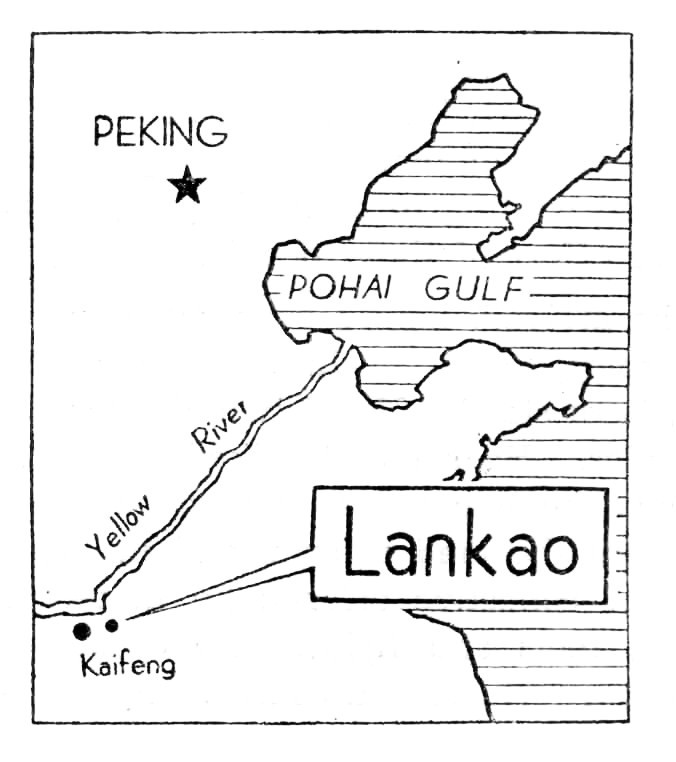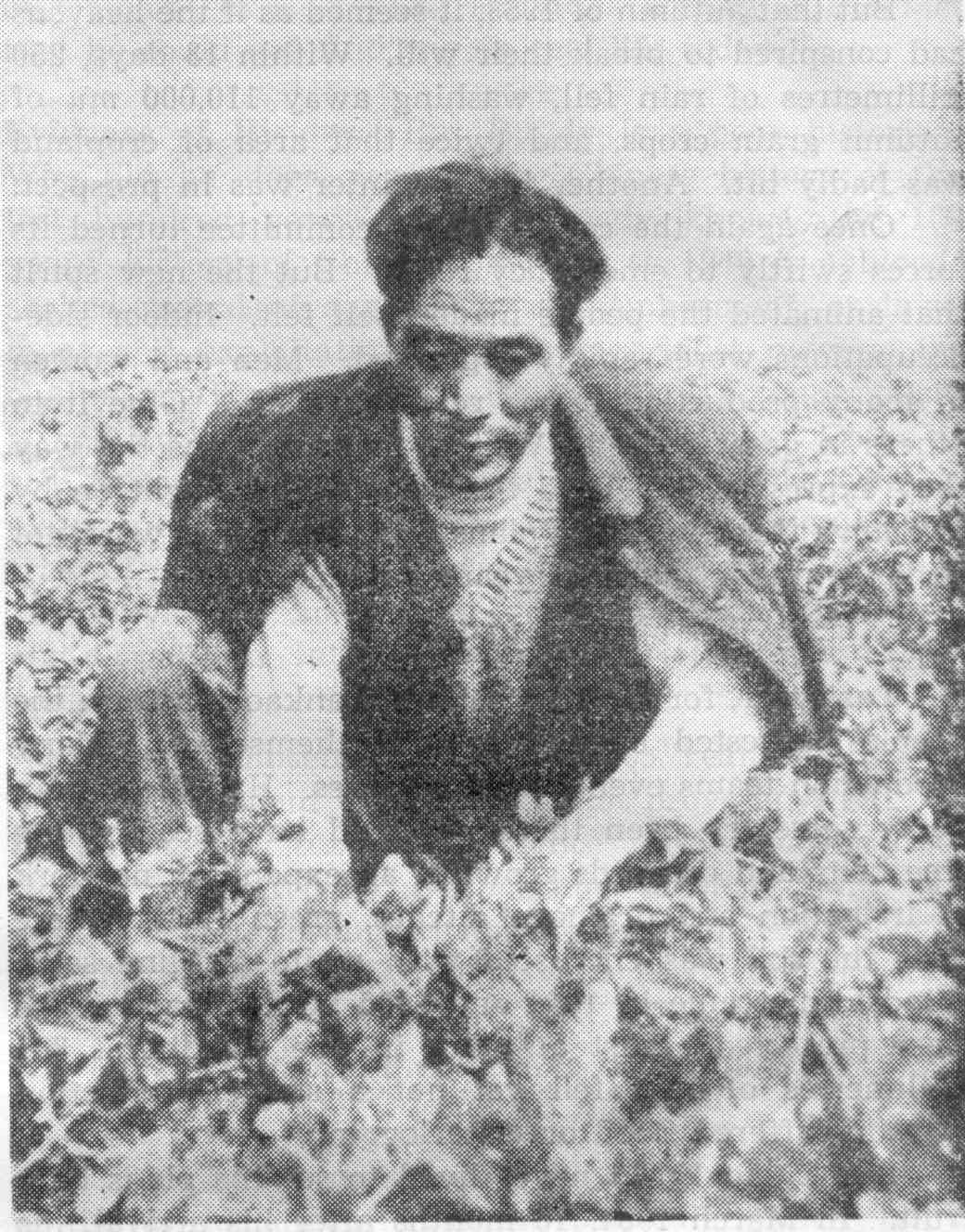Revolutionary Leadership
County Party Secretary Chiao Yu-lu
[This article is reprinted from Peking Review, Vol. 9, #9,
Feb. 25, 1966, pp. 5-8. Thanks are due to the WWW.WENGEWANG.ORG
web site for some of the work done for this posting.]
Hailed as “an outstanding pupil of Chairman Mao,” Comrade Chiao Yu-lu is typical of the new type of man who is appearing In ever increasing numbers as China’s socialist revolution and construction forge ahead under the leadership of the Chinese Communist Party and Chairman Mao Tse-tung.
People throughout China are reading about and learning from the example of Comrade Chiao Yu-lu, late secretary of the Lankao County Committee of the Chinese Communist Party.

Poster lauding Chiao Yu-lu.
(Note: This poster did not appear in Peking Review
but was included with the article as posted on the
WWW.WENGEWANG.ORG web site. Our special thanks to them!)
Biographical Note
COMRADE Chiao Yu-lu was born on Aug. 16, 1922. His parents were poor peasants of Shantung Province.
In his youth he was beaten up and jailed by the Japanese invaders and later pressganged for work in the coalmines of northeast China. He escaped and made his way home in 1943. Unable to find a living there he fled to Kiangsu Province where he laboured for a landlord. He returned to his home county in 1945 after the defeat of Japan. The area had not yet been liberated but the Chinese Communist Party was already active there. Chiao Yu-lu joined and fought with the people’s militia. He joined the Chinese Communist Party in Jan. 1946, and as a militia leader he look part in many engagements.
The following year he fought south with the People’s Liberation Army and on reaching Honan Province was assigned work in a rural district there. Later he joined the Loyang Mining Machinery Works where he subsequently became a workshop Party secretary. In 1962, as one of many experienced cadres sent by the Party to strengthen work on the agricultural front, Chiao Yu-lu was first posted to Weishih County and then to neighbouring Lankao. He was Party secretary of this county until his untimely death at the age of 42 on May 14, 1964.
LANKAO County on the border of Honan Province due east of the city of Kaifeng is situated at a point where the mighty Yellow River, in its eastward journey to the sea, suddenly makes an abrupt turn north and then flows northeast, forming a sharp step bend in Lankao. Attacked by churning currents in the high-water season, this was one of the most perilous points along the river. The river overflowed or breached its dykes at this point scores of times in the centuries before liberation, leaving a mass of sand and debris in the flooded area. The consequences were still felt in Lankao even in recent years and after the People’s Government strengthened the dykes and took other measures to end the floods. There were devastating sandstorms in the dry spring months, alkaline soil and waterlogging. Lankao was never able to provide enough food for its inhabitants.
A Testing Time
In 1962, the county was hit by some of the worst natural calamities in history. That spring 200,000 mu of young wheat were killed or buried by sandstorms. The autumn saw 300,000 mu of farmland under water and an additional 100,000 mu of young crops destroyed by rising alkalinity due to waterlogging. Two-thirds of the county’s 900,000 mu of farmland were laid waste.
When the new county Party secretary, Chiao Yu-lu, came to Lankao that December he found farms and homes destroyed, thousands of peasants being evacuated and the county headquarters turned into a relief centre.
But this new county Party secretary saw matters with the eyes of a Communist: Here were 360,000 hardworking people, a reservoir of boundless strength, and 900,000 mu of farmland waiting to be made prosperous through the collective effort of those people.
The day after he arrived, before even many were aware that he had come, Chiao Yu-lu was out seeing for himself how matters stood. He visited the worst-hit production brigades. He sat and talked with the former poor and lower-middle peasants who had had little or no land before the land reform, and must be the mass backbone of collective efforts; he inspected the draught animals, tools and fields. He consulted with cadres and veteran farmers and asked many questions. From one old peasant he learnt that a species of Paulownia, a fast-growing tree of many uses, would hold down the sand. He was told that peanuts did well in the area and that they would also provide feed for raising more draught animals. The more he heard and saw, the more he became convinced that given revolutionary determination and down-to-earth revolutionary leadership the tide of adversity could be halted and reversed.
Revolutionary Optimism
In this tall lean man, cadres and peasants saw a leader of great modesty with a will of iron and full of revolutionary optimism. They took heart.
At county headquarters, food, winter clothing and other relief supplies from other parts of the country were being sent out to the hard-hit inhabitants. Chiao Yu-lu saw that this was at best a defensive stop-gap measure. He proposed to tackle the county’s troubles at their roots with county headquarters leading the attack.
His proposal won the immediate support of Chang Chin-li, the deputy Party secretary. After long discussion the two concluded that Lankao’s future depended on the state of mind of its people. “And a key role in arousing the morale of the people must be played by the leaders,” Chiao Yu-lu summed up. “We must have a fighting leadership.” He called a meeting of the county Communist Party committee and, when all members were assembled, he led them to the railway station.
It was snowing. People were boarding trains for other, better-off, areas where the Government had arranged temporary accommodation for them. Chiao Yu-lu spoke simply: “These people are our own flesh and blood. These calamities are driving them away from their homes. If we fail to lead them in fighting their way out of their difficulties, we shall always feel the shame and the pain of it.”
His words struck home. That night the committee meeting lasted into the early hours of the next morning. They discussed the problem in all its aspects. They found all answers centred on the question of “how to serve the people.” They again studied Chairman Mao’s articles Serve the People, In Memory of Norman Bethune and The Foolish Old Man Who Removed the Mountains. Here, citing the examples of a Chinese revolutionary, a Canadian Communist and an old man in a folk tale. Chairman Mao discusses the revolutionary spirit of wholehearted service to the people and of daring to tackle seemingly insurmountable difficulties. The county committee members saw what they had to do.
At a subsequent meeting they recalled the tenacity with which Lankao’s people had fought the Kuomintang’s white terror during the War of Liberation. They determined to fight back against natural calamities in that same spirit. Difficulties seemed to weigh less heavily.
Bold Proposal
The county leadership put forward a bold proposal: Bring sand-dunes, rivers, and alkaline soil under control within five years! It was an immense undertaking. A great deal of hard and painstaking work would have to be done to rally the people and turn plan into reality. But the county Party committee of Lankao made a solemn vow to the people to conquer their age-old natural enemies.
The first results of the new county Party secretary’s leadership: revolutionization of the thinking of the people; and first and foremost of the leading cadres, the nucleus of leadership.
Secretary Chiao knew that enthusiasm and good intentions alone were not sufficient. As a diligent pupil of Chairman Mao, he also knew that success required “knowing the enemy.” Under his methodical leadership, the committee took heed not to rush unprepared into the tasks they had set for themselves nor blindly grope their way forward. It decided to make a detailed survey of the county to put their plans on a firm, realistic basis.
The idea was discussed thoroughly with the people’s communes, and a working team of 120 people, including cadres, experienced peasants and technicians, was organized. Some comrades, hearing that he had liver trouble, tried without success to get Chiao Yu-lu to stay and direct operations from headquarters.
“I don’t like predigested stuff,” he declared. “I can’t work going only by reports.”
Out to Get The Facts
In collecting first-hand data as a basis for their plans, the Party secretary worked on the principle of investigating things at their most critical point and most critical moment. Following his example others, too, did the same. They let nothing stand in the way of getting the facts. They went out when sandstorms were at their height; when heavy rains pounded down they waded into rushing torrents to take measurements. To chart their course they chased sandstorms and sudden torrents from rainstorms clear across the county and into neighbouring provinces.
These were months of arduous and hectic work, in which Party secretary Chiao often ate sketchy meals and slept in wet fields. By the summer of 1963 the team had collectively covered a distance of 2,500 kilometres and gathered a mass of first-hand data. Chiao Yu-lu himself had visited most of the 149 production brigades scattered over the 1,800 square kilometres of the county.

The 84 “funnels” the wind-driven sand whistled through were charted—shelter belts and windbreaks were planned. All 1,600 sand-dunes were measured and mapped for anchoring down with grass and trees. Streams and water courses were surveyed for dredging or reconstruction. Waterlogged and alkaline areas were marked down for special attention.
When the leadership and people knew exactly what they faced and what had to be done, their confidence in victory was immeasurably strengthened. Plans made and completed, the county got down to work for their realization.
Studying Chairman Mao’s Works
Even in those gruelling months, Chiao Yu-lu found time to keep up with his study of Chairman Mao’s works. Consulting these had become a deeply ingrained practice acquired over his years as a rural and then as a factory cadre. He drew wisdom and strength from his studies. What he learnt helped him quickly spot the crux of complicated problems and find their solutions; helped him rally the county committee and the people of Lankao around him; buoyed him up in the midst of difficulties. It was the source of his boundless revolutionary optimism.
One day, explaining his method of study to members of the county committee, he said: “I talk with people during the day and make investigations to find facts. When I go home I consult Chairman Mao’s writings. In the evening I go over the day’s events in my mind and try to apply what I have read to the problems that crop up. The next morning I make notes.” He was known for the way he constantly studied Mao Tse-tung’s works in order to master Marxist-Leninist theory for guidance in his work and integrally linked theory and practice. This method of his was noted and effectively followed by other cadres.

Comrade Chiao Yu-lu in the field
Comrades working with Chiao Yu-lu quickly discovered that he was as strict in his demands on them as he was on himself. And the demands he made brought out the inner strength of those who worked with him. Selfless and frugal, he dressed, ate and lived little better than the peasants.
With the people, he was like a fish in water. “You’re just another one of us,” said a former poor peasant to Chiao Yu-lu as they sat side by side talking over ways and means of changing the face of Lankao. “You think and feel as one of us.” It was another way of saying that their county Party secretary was a true revolutionary with the interests of the people in his heart, a good pupil of Chairman Mao.
The Mass Line
During the months of investigation the county Party secretary and his comrades never for a moment forgot Chairman Mao’s exhortation to follow the mass line. They read and re-read the lines: “... It is necessary to adopt the method of linking the leading group with the masses, in addition to that of linking the general call with particular guidance.... All correct leadership is necessarily ‘from the masses, to the masses.’ This means: take the ideas of the masses and concentrate them, then go to the masses and propagate and explain these ideas until the masses embrace them as their own, hold fast to them and translate them into action, and test the correctness of these ideas in such action.”
As the county Party secretary and his team moved from place to place they billeted with the peasants and worked with them in the fields “to see, hear, and inquire into what the people thought and wanted,” to test every point in the plan, to learn local experience in combating shifting sand, waterlogging and alkaline soil, and also to spread conviction in the practical possibilities of the great undertaking.
They learnt much from the peasants, taking in the precious knowledge the latter had gained in years of struggle against calamities. And this in turn contributed to better leadership. The county secretary saw that there was plenty of fight in the people, especially among the former poor and lower-middle peasants. His belief in people was vindicated again and again. One village refused state relief although all 27 families there had gathered in less than half a kilogramme per person of sorghum that autumn. They said they would get by by cutting and selling fodder. In another village, the peasants added fresh soil, laboriously dug up spade by spade, to cover up alkali-contaminated top-soil. In a third village, where no crops had been gathered for a whole year, peasants rallied round with all they had to keep their collective economy going.
At a mass meeting of representatives from every Lankao village in September 1963, the county Party secretary publicized these examples of self-reliance and revolutionary persistence. He pictured what could be done by collective endeavour. That was a memorable day in Lankao’s history. No one left the meeting without feeling elated and encouraged by the examples of others. It stimulated their revolutionary determination, stiffened their resolve to improve their lot by their own efforts. The pace of struggle quickened.
But that autumn of 1963, it seemed as if the heavens had conspired to break their will. Within 13 days, 250 millimetres of rain fell, washing away 110,000 mu of autumn grain crops, and twice that area of cropland was badly hit. Another bitter winter was in prospect.
Once again the county Party committee turned its forces swiftly to emergency relief. But the new spirit that animated the people made itself felt. Indoor side-occupations were rapidly organized. Men and women in many production teams refused relief. “Give it to others in greater need. We can manage,” was the way they expressed it. Amid the new trials brought on by autumn’s freak weather, plans were made and work got under way for the next year’s production.
To Victory
Last year, for the first time in Lankao’s history, the people harvested enough to feed themselves. Many production teams even laid in reserves. Had the county Party secretary been there he could have seen young tree belts and orchards growing, an expanding network of irrigation and drainage ditches, green fields where once the soil was encrusted with white alkaline salts. Windstorms came in 1964 and 1965 but Lankao’s crops were protected. Last autumn, in one cloudburst 384 millimetres of rain fell yet not a single production brigade suffered flood or waterlogging.
But Chiao Yu-lu never lived to see his plans bear fruit. In March 1964, 16 months after his arrival, his health rapidly worsened. His comrades sent him off to Peking for treatment. Specialists there found that he was suffering from cancer of the liver and had not long to live.
The welfare of the 360,000 people of Lankao was always uppermost in his mind, but the county secretary had never had a moment to pay attention to himself. His family and comrades had urged and argued but he had obstinately refused in those critical months to take time off for treatment.
His last words were: “I’m sorry I haven’t finished the task the Party gave me.” When comrades came for his things at the hospital, they found with him—Selected Works of Mao Tse-tung and How To Be a Good Communist by Liu Shao-chi.
* * *
The Chinese people honour the memory of the martyrs who gave their lives for the rising revolution in the bitter struggles against imperialism, feudalism and bureaucrat-capitalism. Today, they celebrate new heroes, like Lei Feng, Wang Chieh, Mai Hsien-teh and countless others, who carry on that great tradition in new circumstances. Comrade Chiao Yu-lu is of that glorious company of new men of the working people steeled and tested in the demanding struggles of socialist revolution and construction.
In the context of the current nationwide discussions on revolutionization of county Party committees which began in October last year, the example of the late Party secretary of Lankao has particular significance. The aim of these discussions is to improve the quality of leadership in the county committees according to the teachings of Chairman Mao Tse-tung and so serve the people wholeheartedly, like Comrade Chiao Yu-lu, the better to lead the people in building a new, socialist countryside.
Contents page for this Peking Review issue.
Peking Review article list (in date order).
Peking Review article list (by subject).